What do the symbols of Shrovetide mean?
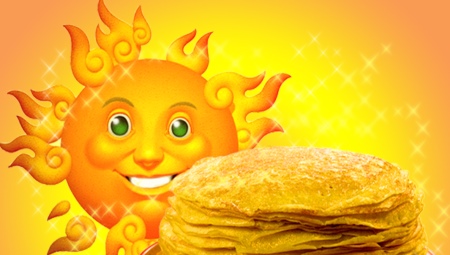
Shrovetide is a great opportunity to rejoice from the bottom of the heart the arrival of the long-awaited spring and warmth. Like any holiday, Maslenitsa has many symbols and ancient traditions.
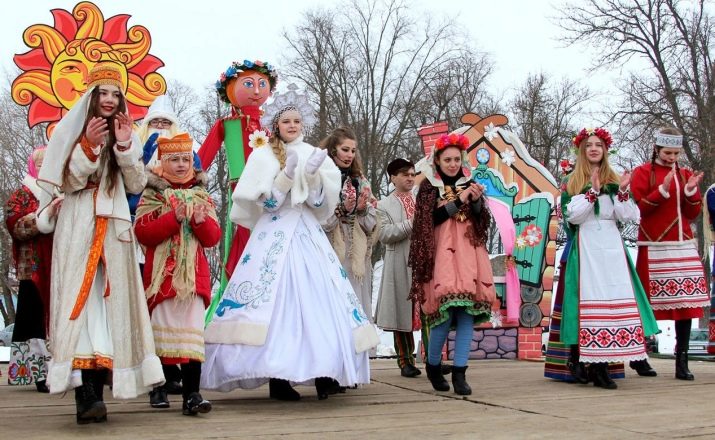
What was Maslenitsa a symbol of?
Before Christianity was adopted, the Russian people professed paganism - polytheism, worshiped the sun god Yarila - a character who personified fertility and the strength of life.
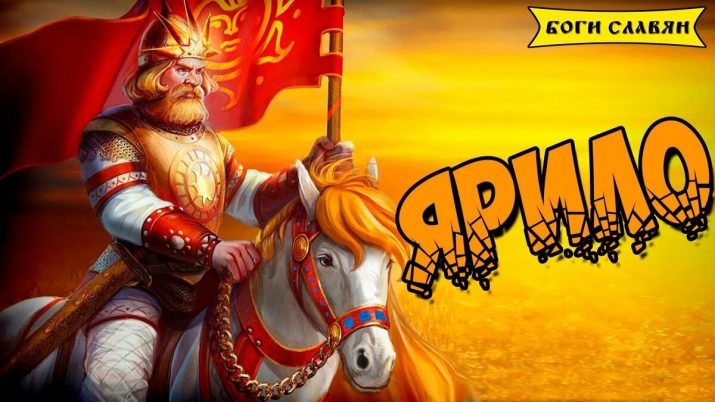
It was then that the custom appeared to bake various pancakes as a symbol of the awakening of the long-awaited sun after the winter cold.
Shrovetide is a spring holiday that lasted a whole week before Lent. It was a joyful farewell to a difficult winter, a cheerful expectation of life changes for the better. Each of the days of the traditional Maslenitsa had its own name.
- A meeting. On this day, festivities began, the very first pancakes were baked - most often with butter or honey. From the very morning, children built a stuffed animal from straw, pieces of burlap, and also put clean clothes on the stuffed animal. At the end of the day, the resulting scarecrow was taken to the highest mountain, where people had fun all day on sledges or other devices.
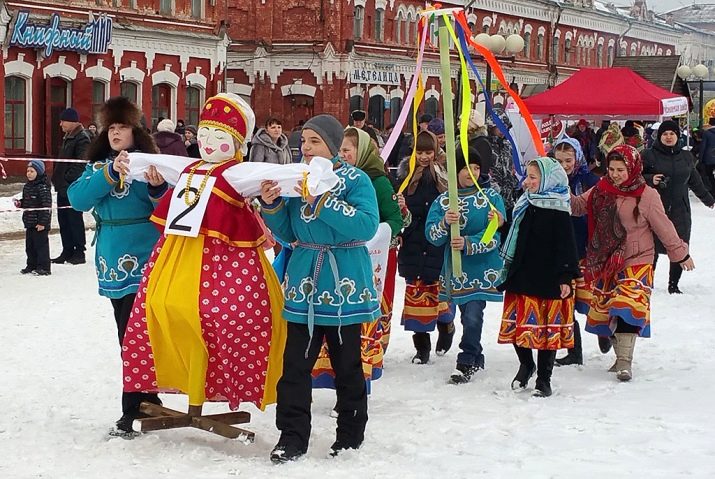
- Flirting. Everyone continued to ride down the mountain or change to a sleigh with horses to start the walks. Theatrical performances were held in the booths, where the main characters were Maslenitsa characters. The second holiday was devoted to honoring the newlyweds. All young couples, whose wedding not so long ago, had to go down the ice mountain.
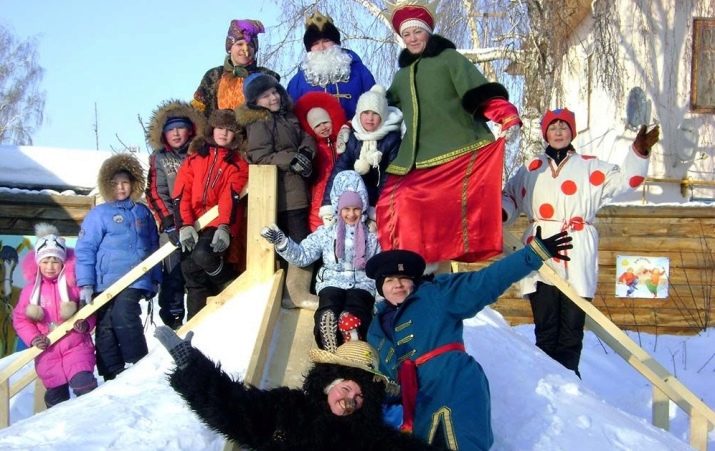
- Gourmet. The main entertainment was baking pancakes - that's why such a name. They ate fish or cheese products, traditional butter, milk or sour cream with pancakes. On Wednesday, the mother-in-law called the sons-in-law for pancakes.On the same day, free guys and girls actively rode down the icy mountains in order to successfully marry or get married this year.
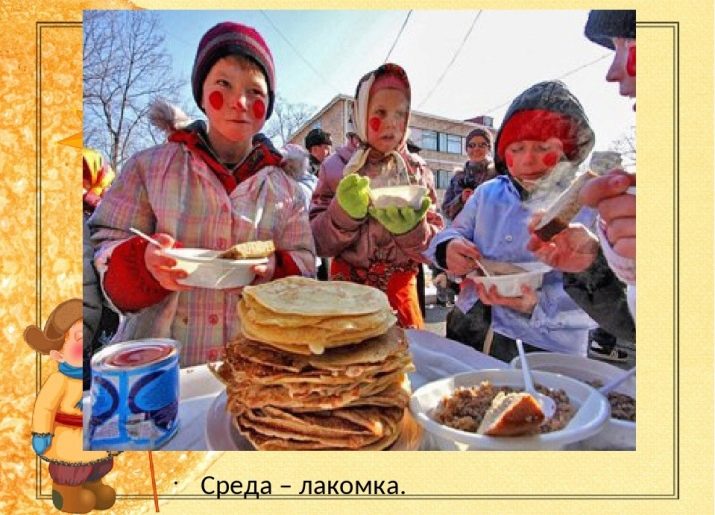
- Take a walk. That very day, a straw effigy was raised to the highest snowy mountain. The whole village gathered for Thursday's festivities to take part in comic fist fights or take a snow fortress for gifts.
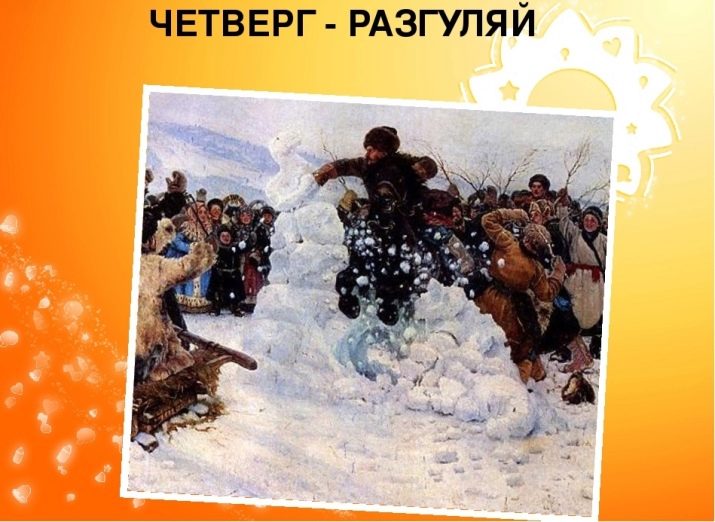
- Mother-in-law's evening. On this day, the mother-in-law was already visiting the sons-in-law. The son-in-law was supposed to invite his wife's mother to pancakes the day before, and in the evening she was obliged to give him everything that was needed to bake the pancakes: a container for dough, pans, flour or buckwheat, butter.
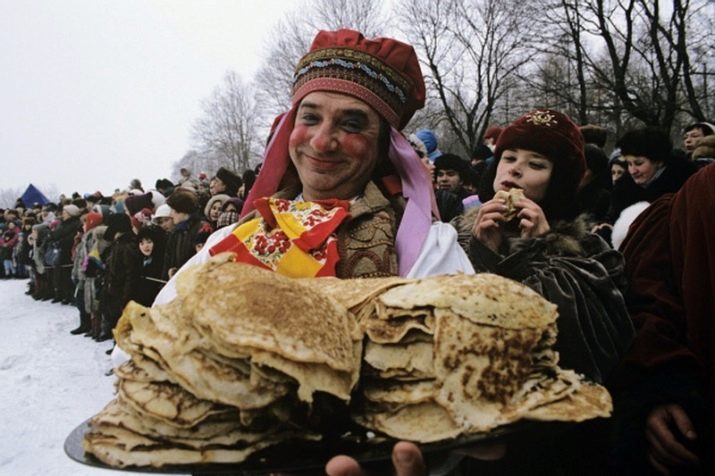
- Sister-in-law gatherings. On Saturday, the young wife invited her husband's relatives to visit. If the sister-in-law was in the status of unmarried, then the newly-born daughter-in-law called her unmarried girlfriends to the table, if the husband's sisters were already married, then the daughter-in-law would sit her married girlfriends at the table. On this main holiday, the Maslenitsa effigy with merry songs was successfully “buried”: a huge fire was kindled and the existing effigy was burned to the ground. They sang and danced near the merrily blazing fire.
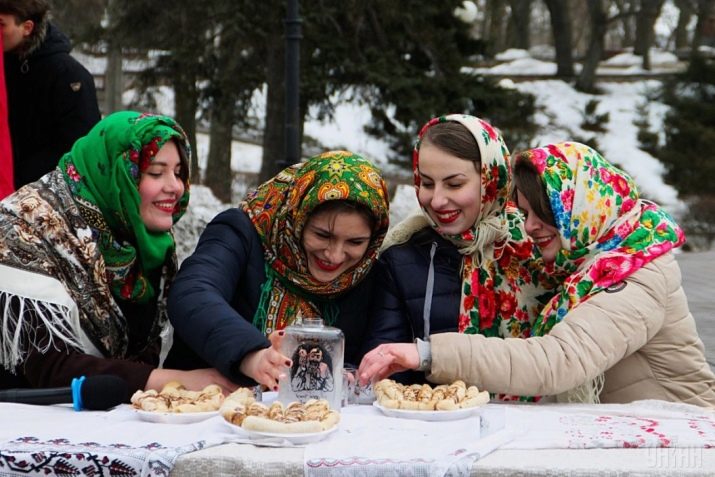
- Forgiveness Sunday. The holiday was coming to an end on Sunday. People began to ask for forgiveness from others. It was impossible not to forgive. On this day, all insults and insults were forgiven. Also on this day, relatives went to the graves of the deceased and brought them pancakes to apologize to those with whom they could no longer see.
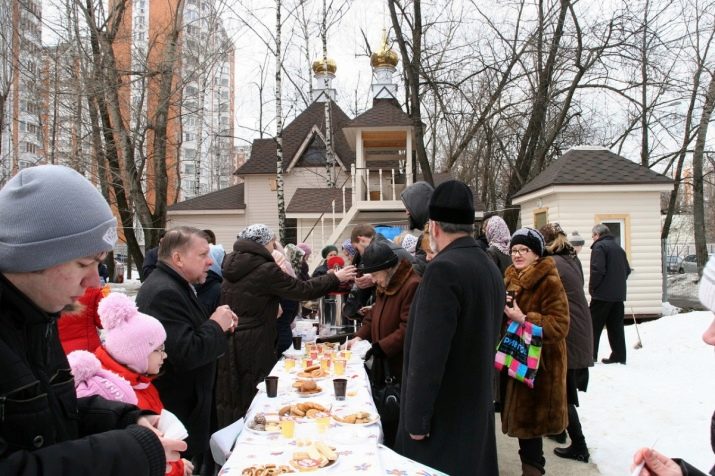
What do pancakes mean?
The main symbol of the holiday is pancakes. The pancake itself is very much like the sun, which everyone is looking forward to after a long and cold winter. For this reason, a lot of pancakes were baked - they were thick or thin, with or without fillings, from wheat or rye, buckwheat or oat flour. Served ready-made pancakes with fish and caviar, honey or eggs, but still more often with a lot of oil.
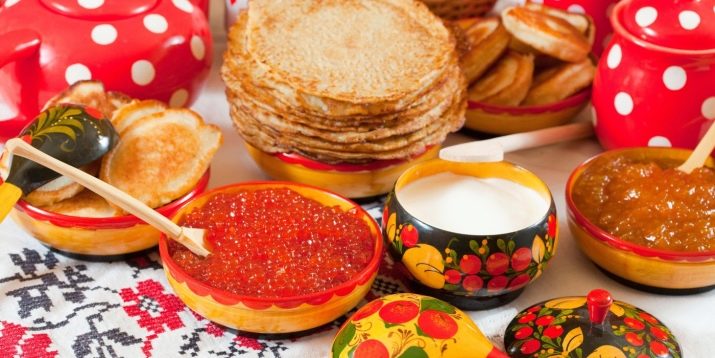
It was necessary to "butter up" the sun, hence the name of the holiday - "Maslenitsa".
The rich baked pancakes on Monday, the poor only on Thursday or only on Saturday. The hostesses prepared the dough for pancakes according to special recipes and accompanied by secret rituals. Maslenitsa could not do without various pancake fortune-telling. The most famous is fortune telling by the very first pancake. A beautiful, evenly baked pancake promised an unmarried girl a good husband and wealth, a pancake with badly torn edges - to an unhappy marriage; a thick product - to a smart and rich groom.
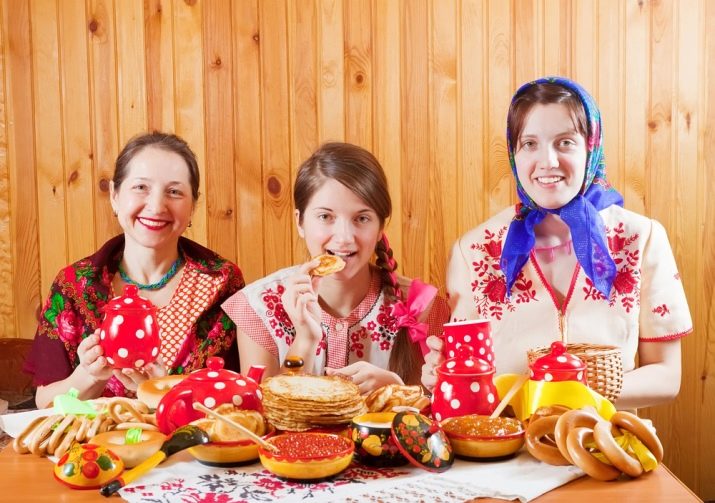
Scarecrow meaning
Another main symbol of Maslenitsa is a straw effigy, which in some old sources was called Marena. This was a well-known character who, for ordinary people, embodied the outgoing winter and personified death receding before life. Marena was greeted with merry songs at the very beginning of the holiday and also merrily seen off at the end. Seeing off the winter cold, the villagers burned the effigy on a special bonfire, which was made only on a hill. In Christianity, the meaning of Pancake Week was reconciliation with all neighbors, complete forgiveness of any insults, careful preparation for Great Lent.
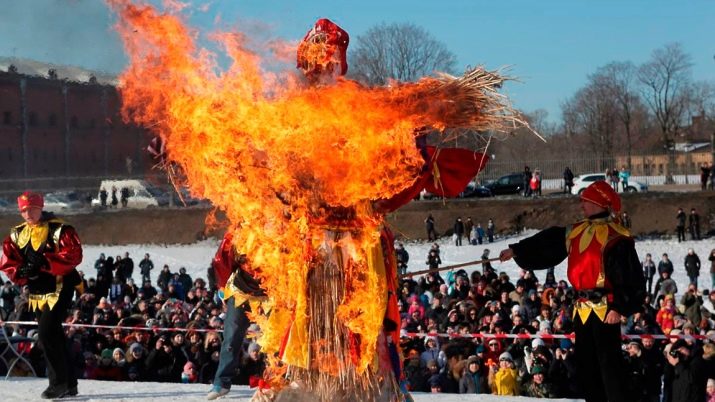
Seeing off Maslenitsa was organized so that the land would give a rich harvest and to "butter up" the soil, special people scattered the ashes from the burnt effigy over the fields. Also, people believed that when a scarecrow was burned, it would take with it all the hardships and diseases.
Other symbols
The bear is another recognizable symbol of Shrovetide. A certain person dressed up in a bearskin or sheepskin coat. The mummer walked like a real bear, and round dances were formed around him, the main purpose of which was to wake up the "bear" that had not yet woken up. The costumed man, in turn, caught someone from the nearest round dance and portrayed the "fight" of an animal and a person.
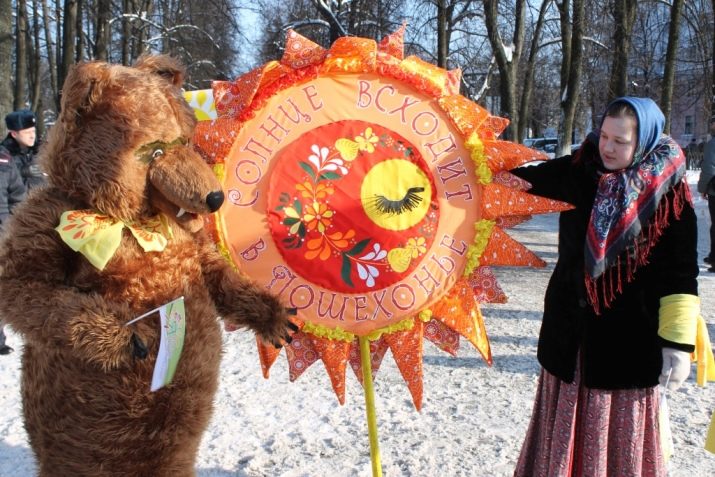
On Shrovetide, a circle was a very popular symbol.
Usually, a strong wheel from a cart was decorated with ribbons and on a high pole was moved along the village streets, with songs they went around the village many times on a sleigh. The girls sang and danced in round dances, since in appearance a round dance is also an impromptu wheel.
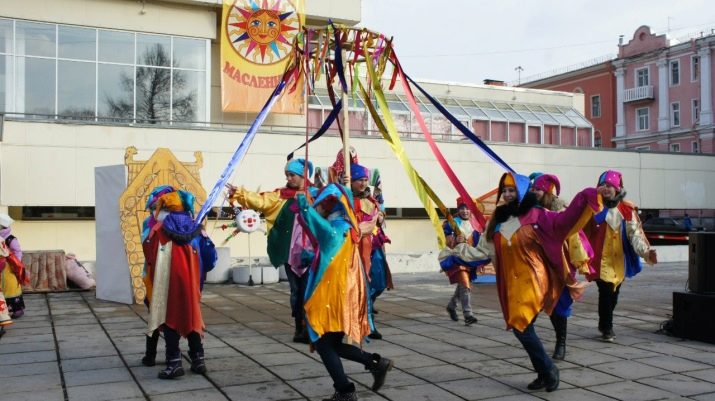
Also, old burning wheels were lowered from the hills. According to the omen, a happy and rich year awaits the one whose wheel rushes home without ever falling. For girls, a successfully rolled wheel meant an early marriage.
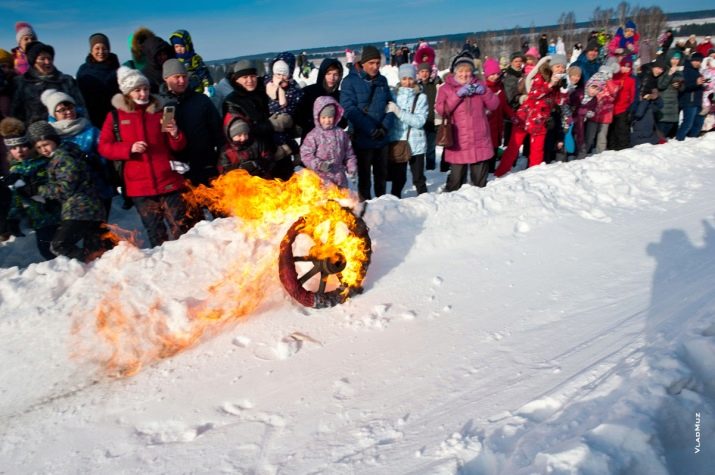
For the meaning of Shrovetide symbols, see the video.








